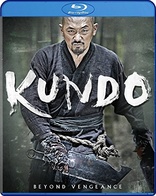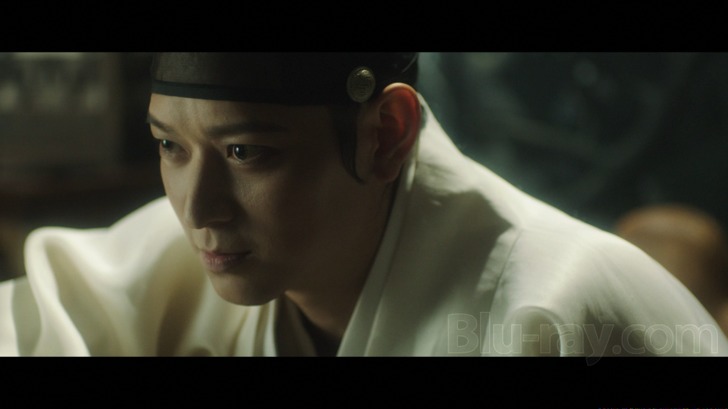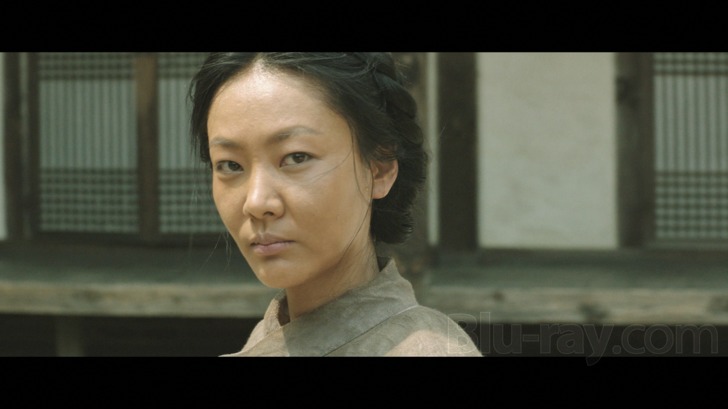Kundo Blu-ray Movie
HomeKundo Blu-ray Movie 
Well Go USA | 2014 | 138 min | Not rated | Oct 21, 2014
Movie rating
7 | / 10 |
Blu-ray rating
| Users | 0.0 | |
| Reviewer | 3.5 | |
| Overall | 3.5 |
Overview
Kundo (2014)
As the illegitimate son of a gisaeng and a nobleman, Jo Yun grew up enduring the spite and antipathy of his father and stepmother. After his brother's death, Jo Yun seizes the chance to secure power and fortune by plundering the poor and eliminating those in his way, including his own family members. He hires poor butcher Dochi to assassinate his pregnant sister-in-law, but Dochi backs out on the deed. For turning on Jo Yun, Dochi loses his family and nearly his own life, but he gets saved by the kundo. From that day on, Dochi grows into a new man with a singular purpose: bloody revenge against Jo Yun.
Starring: Ha Jung-woo, Yeri Han, Gang Dong-won, Ma Dong-seok, Kim Hae-sookDirector: Yoon Jong-bin
| Foreign | 100% |
| Action | 14% |
Specifications
Video
Video codec: MPEG-4 AVC
Video resolution: 1080p
Aspect ratio: 2.39:1
Original aspect ratio: 2.39:1
Audio
Korean: DTS-HD Master Audio 5.1
Korean: Dolby Digital 2.0
Subtitles
English
Discs
50GB Blu-ray Disc
Single disc (1 BD)
Packaging
Slipcover in original pressing
Playback
Region A (B, C untested)
Review
Rating summary
| Movie | 3.5 | |
| Video | 4.5 | |
| Audio | 4.0 | |
| Extras | 0.5 | |
| Overall | 3.5 |
Kundo Blu-ray Movie Review
Do they even have spaghetti in Korea?
Reviewed by Jeffrey Kauffman October 21, 2014According to several news sources, Kundo had bragging rights for “all time biggest opening day” in South Korean cineplexes—for approximately one week, anyway, after which it was subsumed by whatever blockbuster came next. Korea’s film industry may obviously be in an era of significant expansion and popularity, but the sad fact remains that many Westerners are still woefully under informed about the Korean Peninsula’s tumultuous history, at least with regard to events prior to the mid-20th century. Kundo details a rather convoluted tale (especially in the somewhat lurching presentation within the film itself) that takes place circa 1862 at the tale end of the so-called Joseon Dynasty. Though the Joseon era lasted several centuries, by the mid-19th century it was on its last legs, with rampant corruption throughout the privileged classes and seemingly nonstop incipient rebellions in the peasant class. Kundo begins with a fairly disturbing scene showing the aftermath of one such rebellion, when the carrion of peasant corpses is being picked over by scavenger birds and even dogs. The film then enters the fray in a melodramatic story pitting the illegitimate heir to power against a lowly butcher (evidently the absolute nadir of Korean society at the time). The storytelling here is oddly patchwork at times, leading to perhaps even more confusion on the part of Western audiences not exactly up to speed with the general history to begin with, but Kundo features some extremely visceral fight sequences along with some genuinely compelling performances, all wrapped up in a visually spectacular presentation.

While the general setup of Kundo can be boiled down to what amounts to a Korean version of Robin Hood, getting there is a rather long and winding road. The film nicely pits the haves against the have nots, showing the opulent lifestyle of a local governor named Choi Hyun-ki (Kim Jong-gu) who is being feted with a lavish birthday party while a ragged group of mourners “disturb” the festivities outside his estate, begging for even a bowl of soup. Those mourners turn out to have some ulterior motives, just the first of several detours Kundo takes in the early going as it slowly doles out information about a rather large cast of characters.
Two of the central characters turn out to be Choi’s illegitimate son Jo Woon (played by Kang Dong-won as an adult), initially seen as a hopeful young boy torn from his concubine mother because Choi does not yet have a legitimate (male) heir by his actual wife. When that wife manages to pull a Sarah of sorts and give birth to a boy late in her life, Jo Woon is shuttled off to the sidelines, now seen as an embarrassment by his father and especially his step-mother. Jo Woon overcompensates by becoming a bully, almost a sadist even, developing considerable martial arts skills. In one of the film’s heavily narrated by still underdeveloped sequences, he returns to his father’s fold as an adult after virtually the rest of the family (including his half brother, stepmother and real mother) are killed. Unfortunately for Jo Woon, his half brother’s wife is expecting, and Jo Woon doesn’t want any new potential heir getting in the way of what he sees as his rightful succession.
Jo Woon’s machinations to “deal” with his sister-in-law and her unborn child ultimately involve butcher Dolmuchi (Ha Jung-woo), who is recruited to kill the woman by one of Jo Woon’s henchmen. Dolmuchi is given a specious motive for the need to off the expectant mother, but once Dolmuchi sees that she is pregnant (something not divulged to him initially), he has pangs of conscience and refuses to consummate the deal. That puts him at odds with Jo Woon’s ruthless cadre, and soon Dolmuchi finds his world upended in a tragedy that leaves several people dead and Dolmuchi horribly scarred by a fire.
It ultimately comes as no surprise that Dolmuchi is finally recruited by the gang of “mourners” seen in the film’s opening sequence, a gang known as the Chusul Clan, a coterie of freedom fighters who, in the best Robin Hood tradition, steal from the rich in order to give to the poor. That finally sets up the film’s central focus, as a vengeance seeking Dolmuchi (now “rebranded” as Dolchi) joins with his new aggregation to bring justice to a ravaged Korean landscape.
The above précis is actually a good deal more straightforward and linear than Kundo’s actual presentation. The film features a lot of narration to help bridge various seemingly unrelated sequences, and there’s a further discombobulation added by the film’s tendency to dart off into sidebars, both plotwise and temporally (courtesy of flashbacks). That approach therefore requires a bit of patience on the viewer’s part, until the many jigsaw pieces have finally more or less settled into place.
What actually sets Kundo apart from many similarly themed historical epics is its bracing style, one that is obviously culled from such disparate sources as Sergio Leone and Quentin Tarantino. This is not a stuffy costume drama where the characters seem like remote titans seen from afar. The film exploits a modern vernacular, including lots of F-bombs dropped by everyone from elders to scrappy little kids, as well as a winking subtext that is at times oddly anachronistic given the gruesome violence being depicted. Director Yoon Jong-bin plays with perspective, juggling storylines the way that Tarantino favors, and he also invests the film with the hyperbolic intensity that suffuses many Leone outings (this includes a score obviously modeled on the iconic work of Ennio Morricone).
Kundo may therefore be an example of style over substance, but there is a surprising amount of emotional content here given Dolchi’s traumas. The film, like the road to justice it portrays, tends to wander off into the Korean woods now and again, but at least there’s a lot to look at and listen to during the occasional detours.
Kundo Blu-ray Movie, Video Quality 

Kundo is presented on Blu-ray courtesy of Well Go USA with an AVC encoded 1080p transfer in 2.39:1. This digitally shot feature boasts often quite spectacular levels of detail, with elements like Dolchi's scarred head or the ragged outfits the peasants wear popping very vividly. Key sequences are very heavily color graded, with many segments have a burnished beige or taupe, almost sepia toned, ambience. Contrast is boosted at times, leading to a slightly effulgent quality, and revealing minor banding issues. Stability is excellent and the many outdoor scenes offer some great depth of field. When not artificially tweaked, colors look natural and are nicely saturated.
Kundo Blu-ray Movie, Audio Quality 

While Kundo's lossless DTS-HD Master Audio 5.1 track (in the original Korean) provides ample opportunity for well done immersion courtesy of the fantastic martial arts sequences, the surround activity is somewhat mitigated by the film's reliance on ubiquitous narration. That is placed front and center, though actual dialogue scenes exploit directionality rather well. Fidelity is excellent, and there's some rather robust LFE wafting through several set pieces. Finally, there are no issues of any kind to report on this track.
Kundo Blu-ray Movie, Special Features and Extras 

- Trailer (1080p; 1:57)
Kundo Blu-ray Movie, Overall Score and Recommendation 

From a pure storytelling perspective, Kundo is a bit inartful, especially in the early going, something that tends to undercut any compelling bond between the viewer and the film. However, once the many pieces are in place and the story settles down into its main focus, there's a lot to enjoy here, even if overall the film can seem a trifle self indulgent at times. Obviously influenced by Tarantino and Leone, Yoon Jong-bin introduces some unexpected elements into this historical martial arts epic, and if the results aren't completely successful, at least they're often fairly innovative. Technical merits here are very strong, and Kundo comes Recommended.
Similar titles
Similar titles you might also like

An Empress and the Warriors
江山·美人
2008

Dragon Inn
龍門客棧 / Long men kezhan
1967

Let The Bullets Fly
Collectors Edition | Rang Zi Dan Fei
2010

Ong Bak 3: The Final Battle
2010

Along with the Gods: The Two Worlds
신과함께: 죄와 벌 / Singwa hamgge
2017

Tai Chi Hero
Tai Ji 2: Ying Xiong Jue Qi
2012

The Assassin
刺客聂隐娘 / Ci Ke Nie yin niang
2015

Chocolate
2008

A Touch of Zen
俠女 / Xia nü
1971

Operation Red Sea
红海行动 / Hong hai xing dong
2018

On the Job
2013

War of the Arrows
Choi-jong-byeong-gi Hwal
2011

True Legend
Su Qi-Er
2010

The Suspect
2013

The Guillotines
Xue Di Zi
2012

Five Superfighters
Tang shan wu hu / 唐山五虎
1979

Executioners from Shaolin
The Executioners of Death / Hong Xi Guan
1977

Furie
Hai Phuong
2019

Shadow 4K
影 / Ying
2018

King Boxer
Five Fingers of Death / Tian xia di yi quan
1972